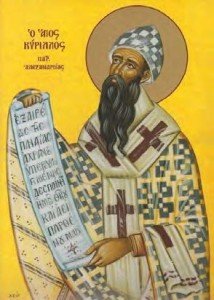In this article I have been exploring the “role” of Christ as Savior in the East. Cyrillian Christology implied that divinity and humanity were compatible and that Christ’s own particular humanity, although it was assumed in its incomplete state, was deified through the cross and resurrection and thus revealed the true purpose of creation in conformity with its divine model. Christ was and is the New Adam because, in Him, humanity and divinity are/were united.
The Christological definitions of the councils of Ephesus, Chalcedon and Constantinople – as well as the dogma of Constantinople III on the two wills of Christ, entered the common tradition of Eastern and Western Christendom. However, the West remained somewhat reluctant in the face of the doctrine of “deification.” Resistance against the council of 553 – and the Roman popes who accepted it – lasted until the seventh century. Even later a more analytic and more rational concern from persevering the humanity of Jesus – in a way similar to the Antiochian tradition of Theodore of Mopsuestia – remained prevalent in Western Christological thought. Redemption and salvation tended to be understood as a “reconciliation” with God rather than as “communion” with God. Of this trend the Anselmian theory of redemption as “satisfaction” was the ultimate result.
If you have been following the articles in this Bulletin, you will immediately recognize that the Eastern Church does not subscribe to this understanding of redemption. Our Eastern spirituality focuses on the call we have been given from God to actualize our potential to enter into an ever deeper communion with Him. God has so designed human life that each of us is given multiple opportunities to grow in our relationship with God.
On the level of piety and spirituality, the image of suffering Jesus – “paying off” the price of our sins – began, in the West, to replace the Byzantine vision of the incarned Logos, triumphant over death and through whose victory resurrection has become accessible as an eschatological (eschatology: the part of theology concerned with death, judgment, and the final destiny of the soul and of humankind) anticipation in the body of His Church. As we sense the difference that exists between the Eastern and Western Church’s understanding of redemption and salvation, we must remember not to label one as right and the other as wrong.

